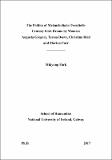| dc.contributor.advisor | Ó Cinnéide, Muireann | |
| dc.contributor.author | Park, Mikyung | |
| dc.date.accessioned | 2018-10-05T11:27:58Z | |
| dc.date.issued | 2017-09-30 | |
| dc.identifier.uri | http://hdl.handle.net/10379/14578 | |
| dc.description.abstract | This thesis explores the dynamics of national and historical melancholia as invoked in twentieth-century drama of four Irish women, Augusta Gregory (1852-1932), Teresa Deevy (1894-1963), Christina Reid (1942-2015), and Marina Carr (1964–). It offers a theoretical and historical approach to major works that achieved significant success in Irish theatre but have been diminished in the canon formation. I argue that melancholic assimilation of socially ‘undesirable’ elements, often a gendered process, has been a key practice in the social, cultural, and political landscape of both South and North of Ireland. I propose melancholic performance as the umbrella critical device to investigate how the playwrights aesthetically respond to and challenge the gendered discourses of exclusion and defeat. Distinguished from the conception of performance as a singular act of expression in the present, melancholic performance refers to the continuous and compelled engagement with loss, exposing the affective genealogy of what appears on stage. Employing this theoretical device, I argue that these playwrights embed melancholic states and performative acts structurally into the selected plays, although on very different aesthetic or semiotic terms. Their embrace of melancholia also exposes melancholic alterity – social elements that the modern/contemporary (Northern) Irish state can neither fully incorporate nor entirely abandon – as a lived experience for marginalized (female) subjects in Irish drama. Creatively reworking a melancholic loss and abjection, however, these playwrights transform the affective state into a battleground for negotiations between various opposing forces. This thesis ultimately envisions the capacity of melancholic performance as a critical tool for elucidating painful migrations occurring when the boundaries are broken. Rather than aspiring to a positive resolution to existing conflicts represented in the works, melancholic performance reinscribes the meaning of struggles, including performative failure of female agency, as a demand for a change in power relations within society. | en_IE |
| dc.publisher | NUI Galway | |
| dc.rights | Attribution-NonCommercial-NoDerivs 3.0 Ireland | |
| dc.rights.uri | https://creativecommons.org/licenses/by-nc-nd/3.0/ie/ | |
| dc.subject | Irish drama | en_IE |
| dc.subject | Historical melancholia | en_IE |
| dc.subject | Melancholic Performance | en_IE |
| dc.subject | Melancholic alterity | en_IE |
| dc.subject | English | en_IE |
| dc.subject | Humanities | en_IE |
| dc.title | The politics of melancholia in twentieth-century Irish drama by women: Augusta Gregory, Teresa Deevy, Christina Reid and Marina Carr | en_IE |
| dc.type | Thesis | en |
| dc.local.note | This thesis examines how four Irish playwrights creatively engage with discourses of historical loss in twentieth-century Irish drama. Centring on major works by Augusta Gregory, Teresa Deevy, Christina Reid and Marina Carr, the thesis argues that these playwrights rework affective states of melancholia to challenge historical, cultural, and political narratives that elide exiting conflicts and struggles in society. | en_IE |
| dc.description.embargo | 2022-09-20 | |
| dc.local.final | Yes | en_IE |
| nui.item.downloads | 81 | |


